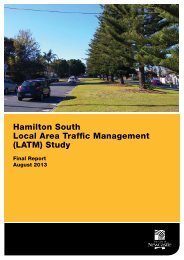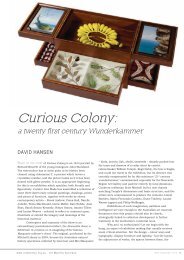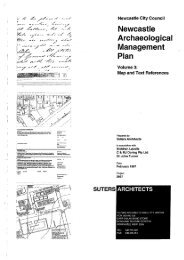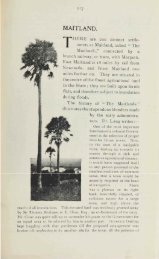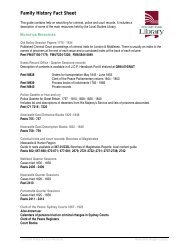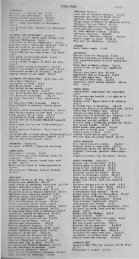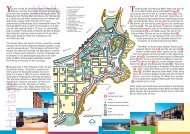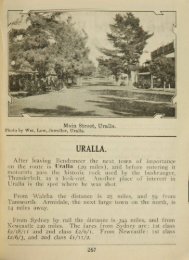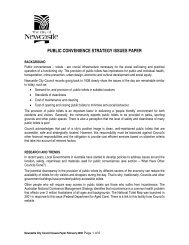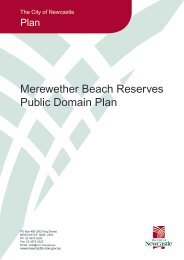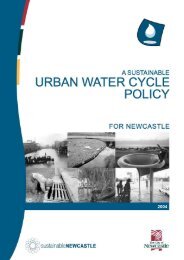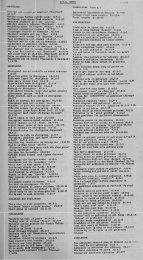Gay and lesbian community - Newcastle City Council
Gay and lesbian community - Newcastle City Council
Gay and lesbian community - Newcastle City Council
Create successful ePaper yourself
Turn your PDF publications into a flip-book with our unique Google optimized e-Paper software.
GAY & LESBIAN<br />
BACKGROUND<br />
Towards the end of the process of preparing the previous Social Plan (2000 - 2005), members<br />
of the gay <strong>and</strong> <strong>lesbian</strong> <strong>community</strong> highlighted the need to prepare a discussion paper that would<br />
specifically address their <strong>community</strong> concerns for incorporation into the next Community Plan.<br />
It is important to recognise that gay <strong>and</strong> <strong>lesbian</strong> communities are socially diverse due to factors<br />
such as cultural background, religion, age <strong>and</strong> socio-economic status. The number of people in<br />
<strong>Newcastle</strong> who identify as gay <strong>and</strong> <strong>lesbian</strong> is unknown. However, US data suggests that<br />
between 3% to 8% of the population identifies as gay, <strong>lesbian</strong> or bisexual (Zirngast, 2002). This<br />
indicates a gay <strong>and</strong> <strong>lesbian</strong> <strong>community</strong> of between 4,000 to 11,000 people in <strong>Newcastle</strong>.<br />
Throughout this paper, the commonly used expression of gay <strong>and</strong> <strong>lesbian</strong> will be used<br />
interchangeably with gay/<strong>lesbian</strong>/bisexual/transgender/intersex/queer (GLBTIQ) or people with<br />
diverse sexualities, <strong>and</strong> is intended to cover the diversity of people within these communities.<br />
These terms are open to debate, both within <strong>and</strong> outside the GLBTIQ <strong>community</strong>, reflecting the<br />
fluidity of sexual <strong>and</strong> gender identities <strong>and</strong> the importance that members of marginalised groups<br />
can attach to the processes of self-definition <strong>and</strong> redefinition.<br />
<strong>Council</strong> has provided support to the GLBTIQ communities through grants <strong>and</strong> sponsorship.<br />
Recent examples include the Rainbow Visions Community Picnic <strong>and</strong> a series of creative<br />
workshops. <strong>Council</strong> also provides ongoing space at the Youth Venue for an under 18’s social<br />
group for GLBTIQ youth (Rainbow Divas) <strong>and</strong> an under 25 social group (Q25).<br />
TRENDS, POLICY AND LEGISLATION<br />
Trends<br />
The benefits of a diverse <strong>community</strong> which is open <strong>and</strong> tolerant have been clearly identified in<br />
recent literature (Florida, 2002). Increasingly, regional areas that experience ongoing economic<br />
growth are associated with having (<strong>and</strong> actively promoting) a flexible, accepting <strong>and</strong> dynamic<br />
<strong>community</strong> that supports a sustainable <strong>and</strong> organic cultural life.<br />
The Attorney General’s Report ‘You shouldn’t have to hide to be safe’ (December 2003)<br />
indicates that homophobic hostility <strong>and</strong> violence is still prevalent, but that it is now often more<br />
subtle or hidden than a decade ago.<br />
Comments from members of the gay <strong>and</strong> <strong>lesbian</strong> communities note that their ‘communities of<br />
interest’ have changed over the past decade <strong>and</strong> they are becoming more integrated into<br />
mainstream society. Cited examples of this can be seen in contemporary <strong>Newcastle</strong> venues<br />
with their more blended customer base. However, other gay <strong>and</strong> <strong>lesbian</strong> <strong>community</strong> members<br />
see their <strong>community</strong> as “fragmented” <strong>and</strong> frequently express a desire to draw them closer<br />
together. Further anecdotal evidence suggests that more gay <strong>and</strong> <strong>lesbian</strong> people are choosing<br />
<strong>Newcastle</strong> as a place to live, rather than Sydney, based on the lifestyle choices available in<br />
<strong>Newcastle</strong> <strong>and</strong> it’s accessibility to Sydney.<br />
Discussion Papers for the Community Plan 2006 - 2010 193
TARGET GROUPS <strong>Gay</strong> <strong>and</strong> Lesbian<br />
Federal <strong>and</strong> State legislation impact on same sex couples in a number of different ways.<br />
Federal Government Legislation<br />
The Disability Discrimination Act 1992 makes it unlawful to discriminate against a person<br />
because he or she has a known or assumed association with HIV/AIDS.<br />
The Sex Discrimination Act 1984 makes it unlawful to discriminate on the basis of a person's<br />
sex (also includes martial status, pregnancy, sexual harassment <strong>and</strong> family responsibilities),<br />
however, "sex" does not include "sexual orientation".<br />
The Federal Marriage Act 1961 has been recently amended in 2004 to confine the institution<br />
of marriage to opposite-sex couples. No church or recognised religion presently permits<br />
same-sex couples to be married in Australia. Debate about this issue is currently happening<br />
at the Federal level. There are no Federal registered partnership or civil union laws in<br />
Australia.<br />
The Federal Family Law Act 1975 also makes a similar statement, <strong>and</strong> furthermore, does<br />
not give same sex partners any legal status regarding their partners biological children.<br />
However, some l<strong>and</strong>mark court cases have awarded parenting orders to a gay couple.<br />
The Federal Superannuation Act 1990 has been amended in 2004, exp<strong>and</strong>ing the definition<br />
of dependent to include any person with whom the deceased has an interdependency<br />
relationship. This will be satisfied where two people have a close personal relationship, live<br />
together <strong>and</strong> one or each of them provides the other with financial <strong>and</strong> domestic support <strong>and</strong><br />
personal care. The UN had previously condemned the Australian Federal Government for<br />
discrimination against same-sex couples in a Tasmanian case in 2000.<br />
State Government Legislation<br />
In NSW, consenting homosexual activity between men over the age of 18 was decriminalised in<br />
1984. The age of consent for males has recently been lowered to 16, in line with the age of<br />
consent for women. Other relevant State legislation includes;<br />
The Anti-Discrimination Act, prohibits discrimination on the basis of homosexuality, however,<br />
exemptions are permitted in certain areas such as the military <strong>and</strong> some other institutions.<br />
In 1995, a gay couple (one of whom had a biological son living with them) from Carrington<br />
successfully challenged the definition of "family cover" by the local health insurer NIB under<br />
the NSW Anti-Discrimination Act 1977. Their claim was initially refused on the grounds that<br />
the couple were not a family <strong>and</strong> therefore not eligible for family cover. This case set a<br />
precedent in NSW in terms of defining "dependency", however, recognition of same-sex<br />
couples as "family" in a wider legal framework is still in contention.<br />
The Adoption Bill 2000 prohibits same-sex couples from adopting children, however, the law<br />
does not proscribe against providing IVF treatment to single women (it would be unlawful<br />
under the Federal Sex Discrimination Act 1984).<br />
The Property (Relationships) Legislation Amendment Bill (1999) gives same-sex couples<br />
who have been living in a defacto relationship for two years or more, certain partnership<br />
rights such as access to the legal system for property or financial claims, inheritance rights<br />
<strong>and</strong> hospital visiting rights. Same-sex couples can now make claims for property<br />
adjustment <strong>and</strong> maintenance.<br />
Concerns have been raised that the government tender of social services to religious bodies<br />
may increase occasions of indirect discrimination against GLBTIQ clients.<br />
Discussion Papers for the Community Plan 2006 - 2010 194
TARGET GROUPS <strong>Gay</strong> <strong>and</strong> Lesbian<br />
Local Government Legislation<br />
Local Governments are required to prepare <strong>and</strong> implement Equal Employment Opportunity<br />
(EEO) Management Plans under the Local Government Act, 1993. Local Governments are also<br />
required to prepare Social or Community Plans under this Act, which consider the needs <strong>and</strong><br />
well-being of people in their local government area <strong>and</strong> the key issues which impact at a local<br />
level.<br />
ISSUES<br />
Community <strong>and</strong> Family Tolerance<br />
The issues relevant to GBLTIQ youth include both external <strong>and</strong> internal pressures <strong>and</strong> these<br />
pressures can also be both positive <strong>and</strong> negative. Media images of homosexuality are<br />
increasingly positive <strong>and</strong> well received by the general <strong>community</strong> eg TV programs such as<br />
“Queer Eye for the Straight Guy”. Many same-sex attracted young people are comfortable <strong>and</strong><br />
positive about their sexuality, are able to use healthy coping strategies when confronting social<br />
prejudices <strong>and</strong> are well supported by their friends <strong>and</strong> family.<br />
Being a GBLTIQ youth may generate feelings of despair, frustration or anger, as some may<br />
believe a life of prejudice is inevitable because of their sexual orientation. This can lead to<br />
feelings of ambivalence about their sexual identity <strong>and</strong> self-blame, which can be generated if<br />
they are uncomfortable with their sexuality <strong>and</strong> accompanying prejudice.<br />
Negative pressures can increase the risk factors for some individuals (depression, substance<br />
abuse <strong>and</strong> homelessness) for suicide. NSW schools have specific anti-bullying policies in place<br />
to address bullying that may include gay <strong>and</strong> <strong>lesbian</strong> youth. External negative pressures for<br />
youth can include:<br />
Loss of family support - families may not accept their child's homosexuality.<br />
Religion - some religions do not accept homosexual practice.<br />
Harassment - homosexual youth are more likely to experience verbal harassment, physical<br />
abuse <strong>and</strong> destruction of property, particularly at schools.<br />
Homelessness or premature independent living - family problems following the revelation of<br />
sexual orientation can lead to forced homelessness or being forced to live independently at<br />
an earlier age than usual for their peer group. This can be particularly problematic for youth<br />
in an ongoing dependency situation such as TAFE or university attendance.<br />
Discrimination - Australia is predominantly a heterosexual society <strong>and</strong> consequently,<br />
homosexual youth may experience discrimination.<br />
Increased risk for HIV/AIDS - while the threat of HIV is present for heterosexual youth, it is<br />
of particular concern for GBLTIQ youth. This can increase feelings of anxiety or distress.<br />
Maintaining Independence <strong>and</strong> Financial Security<br />
For GBLTIQ people as they age, issues tend to focus on the importance of building sustained<br />
loving relationships. For <strong>lesbian</strong>s, additional issues can include child bearing <strong>and</strong> access to<br />
children after a relationship breakdown. For same sex couples, acknowledgment that they have<br />
the same parental rights <strong>and</strong> responsibilities as heterosexual couples is important.<br />
GBLTIQ adults have the same fears that many ageing adults have <strong>and</strong> these include loneliness<br />
<strong>and</strong> isolation, physical dependence on others, loss of autonomy <strong>and</strong> poverty. “Ageism” can be<br />
a systemic form of discrimination within their own communities. However, coping mechanisms<br />
such as integration into the gay <strong>and</strong> <strong>lesbian</strong> communities, a healthy sex life <strong>and</strong> lack of concern<br />
with hiding their sexuality are key factors that assist in adaptation to the aging process.<br />
Discussion Papers for the Community Plan 2006 - 2010 195
TARGET GROUPS <strong>Gay</strong> <strong>and</strong> Lesbian<br />
Aged care facilities often presume either heterosexuality or asexuality on behalf of old people.<br />
GBLTIQ people face legal complications regarding the status of their relationships, which may<br />
not become fully apparent until they are ageing. These issues can significantly impact on their<br />
financial <strong>and</strong> emotional well being as they age.<br />
Older GBLTIQ people often have a strong social support network but may not have the same<br />
degree of family support. Therefore, appropriate <strong>and</strong> sensitive aged care services become<br />
central to maintaining independence. These services may need to provide more intensive<br />
assistance within the home due to client resistance to moving into aged care facilities that may<br />
not be supportive of their sexuality or seniors sexuality in any form.<br />
The Department of Health <strong>and</strong> Aged Care National Strategy for Ageing Australia does not<br />
currently mention the specific needs of aging GBLTIQ people. Equitable aged care provision to<br />
address the specific needs of GBLTIQ people requires consideration at the Federal level.<br />
The GBLTIQ <strong>community</strong> remains unprotected by legislation that other members of the<br />
<strong>community</strong> currently enjoy. Whilst this situation prevails, same sex partners need to ensure that<br />
they have other strategies in place such as a valid will, enduring power of attorney <strong>and</strong><br />
guardianship. The current conservative political <strong>and</strong> policy environment suggests that reform in<br />
these areas will not be in the short term.<br />
Community Safety<br />
More than 56% of respondents (AG Report) reported experiencing one or more forms of abuse,<br />
harassment or violence in the past 12 months, usually near or at a gay/<strong>lesbian</strong> venue, work,<br />
place of study or their home. Over 8% of those abused in the past year had suffered a physical<br />
injury in the most recent incident, yet only 13% of those respondents had reported the incident<br />
to the police. In three out of four cases, the perpetrators were unknown to the respondents.<br />
In <strong>Newcastle</strong>, current anecdotal evidence reports that people who are perceived to be<br />
homosexual are occasionally physically <strong>and</strong> frequently verbally assaulted. The rate of reporting<br />
of these incidents is assumed to be similar to that indicated in the AG Report. Homophobic<br />
violence impacts negatively not only on homosexual men <strong>and</strong> women but also impacts on their<br />
children, families, friends <strong>and</strong> the broader <strong>community</strong>.<br />
Domestic violence (DV) is being recognised as an issue of concern across all of our<br />
communities <strong>and</strong> for same sex couples, there can be additional concerns. There can be issues<br />
with reporting DV to police, particularly as this can "out" either partner <strong>and</strong> also potentially<br />
reveal the HIV status of a partner if they are positive. Homophobic violence (including<br />
harassment, verbal <strong>and</strong> physical abuse) in any setting is being addressed through ongoing work<br />
by the Attorney General's Department, AIDS <strong>Council</strong> of NSW (ACON) <strong>and</strong> the Lesbian <strong>and</strong> <strong>Gay</strong><br />
Anti-Violence Project.<br />
<strong>Council</strong> regularly hears <strong>community</strong> concern expressed about beats. A ‘beat’ is a public place,<br />
often a public toilet, which is used by some men as a place to meet other men (to initiate social<br />
connections) <strong>and</strong> have sex either at the ‘beat’ or at another place. ‘Beats’ meet a social need<br />
for men, many of whom who do not necessarily identify as gay or bisexual, or who have not yet<br />
'come out', but want to have sex with men. This group of men may not necessarily be engaged<br />
with the wider gay <strong>community</strong> <strong>and</strong> therefore, may not be as aware of the health implications of<br />
unsafe sex. Known ‘beats’ can also become a focus for people who target gay men. There is<br />
evidence that men are increasingly using the internet to meet other local men.<br />
Discussion Papers for the Community Plan 2006 - 2010 196
TARGET GROUPS <strong>Gay</strong> <strong>and</strong> Lesbian<br />
Community Connections<br />
There is currently only one commercial social venue for GBLTIQ people (currently a venue in<br />
Islington but this may vary with changes in management or ownership). There is an identified<br />
lack of venues or activities for GLBTIQ youth, particularly alcohol free ones. The Palais Youth<br />
Venue provides a social venue but is restricted by the availability of times.<br />
Rainbow Visions (a local gay <strong>and</strong> <strong>lesbian</strong> <strong>community</strong> based organisation open to all ages) aims<br />
to improve the well-being of local GLBTIQ people by using a variety of strategies (eg website,<br />
annual <strong>community</strong> festival, information access) to promote <strong>community</strong> participation <strong>and</strong> pride<br />
through <strong>community</strong> connection points.<br />
Community Resources <strong>and</strong> Services<br />
Some <strong>community</strong> members feel that there are not enough services for same-sex relationships.<br />
ACON have only one part-time staff member available for relationship counselling. Same sex<br />
issues are often a variation on who does what in the relationship around equality <strong>and</strong><br />
discrimination issues.<br />
However, other service providers feel that mainstream services would suffice <strong>and</strong> would often<br />
be able to provide a higher level of service for same-sex couples. ACON offer services that are<br />
not regularly patronised but they also do not get a lot of <strong>community</strong> feedback on what services<br />
would be preferred.<br />
There is concern amongst health professionals about a rise in Sexually Transmitted Infections<br />
(STI’s) that appears to be following an increase in unsafe sex practices. This can be seen in<br />
both the heterosexual <strong>community</strong> (particularly chlamydia) <strong>and</strong> in some sections of the<br />
homosexual communities. The greatest proportion of STIs is among homosexually active<br />
males aged 30 - 40 years. This rise has been noted more in Sydney but there is also a slight<br />
increase noted in the Hunter.<br />
KEY ISSUES<br />
Community <strong>and</strong> family tolerance<br />
Maintaining independence <strong>and</strong> financial security<br />
Community safety<br />
Community connections<br />
Community resources <strong>and</strong> services<br />
KEY STRATEGIES<br />
Facilitate <strong>and</strong> encourage <strong>community</strong> initiatives that promote acceptance of diversity<br />
Facilitate <strong>and</strong> promote Youth Venue programs that engage with GLBTIQ youth <strong>and</strong> the<br />
broader <strong>community</strong><br />
Facilitate the inclusion of GLBTIQ issues in the consideration of Senior Novocastrian issues<br />
Facilitate the inclusion of GLBTIQ issues in the development <strong>and</strong> reviews of <strong>Council</strong>'s<br />
Community Safety Policy <strong>and</strong> Crime Prevention Plans<br />
Explore the feasibility of establishing an information delivery hub that can better promote<br />
availability of <strong>community</strong> halls <strong>and</strong> facilities<br />
Develop a Public Toilet Strategy<br />
Discussion Papers for the Community Plan 2006 - 2010 197
TARGET GROUPS <strong>Gay</strong> <strong>and</strong> Lesbian<br />
REFERENCES<br />
‘Geographies of heteropartiarchy: gender <strong>and</strong> sexuality <strong>and</strong> space’, in Waitt, G., McGuirk, P,<br />
Dunn, K., Hartig, K., & Burnley, I., 2000, Introducing Human Geography; globalisation,<br />
difference <strong>and</strong> inequality’, Longman.<br />
ACON, 2004, ‘Community awareness campaign: same sex violence’, Australian Domestic <strong>and</strong><br />
Family Violence Clearinghouse, Newsletter No 17.<br />
Attorney General’s Department NSW, December 2003, ‘You shouldn’t have to hide to be safe’.<br />
Australian Domestic <strong>and</strong> Family Violence Clearinghouse Newsletter No 16, Oct 2003, ‘No More<br />
Secrets: Violence in Lesbian Relationships’, review by Zoe Carven.<br />
Department of Health <strong>and</strong> Aged Care, National Strategy for an Ageing Australia,<br />
www.ageing.health.gov.au/ofoa/agepolicy/index.htm.<br />
Florida, R., The Rise of the Creative Class, Basic Books, New York.<br />
Hazelton, T., 1998, '<strong>Gay</strong> <strong>and</strong> Lesbian Youth Suicide', Module 10, Hunter Institute of Mental<br />
Health, www.himh.org.au/response.<br />
Rainbow Visions Community Picnic 2003 Report.<br />
Shellharbour <strong>City</strong> <strong>Council</strong>, May 2004, ‘Be Yourself: a guide for Lesbians <strong>and</strong> <strong>Gay</strong>s in the<br />
Illawarra’, eds: ACON, IWHC, Wollongong Youth Services.<br />
Victorian Government, Department of Human Services, July 2003, ‘Health <strong>and</strong> sexual diversity’.<br />
Wafer, J., et al, 2000, ‘Out in the Valley: Hunter <strong>Gay</strong> <strong>and</strong> Lesbian Histories’, <strong>Newcastle</strong> History<br />
Monograph No. 15, <strong>Newcastle</strong> Region Library.<br />
Zirngast, N., 2002, 'Aged Care in Australia for <strong>Gay</strong>, Lesbian, Bisexual, Transgender <strong>and</strong><br />
Intersex People', RMIT Student Union Briefing Paper.<br />
CONSULTATIONS<br />
ACON – various staff<br />
Rainbow Visions – various committee members<br />
Hunter Centre for Health Advancement – HIV/AIDs Project Officer<br />
University of <strong>Newcastle</strong>, Queer Collective Convenor (1)<br />
Regional Co-ordinator, Domestic Violence<br />
WEBSITES<br />
www.austdvclearinghouse.nsw.edu.au, downloaded 15/04/04<br />
www.avp.acon.org.au, Lesbian <strong>and</strong> <strong>Gay</strong> Anti-Violence Project’s (AVP) site, accessed 19/03/04<br />
www.gaylawnet.com, accessed 19/03/04 <strong>and</strong> 14/10/04<br />
www.glrl.org.au, accessed on 18/03/04; <strong>Gay</strong> <strong>and</strong> Lesbian Rights Lobby<br />
www.rainbowvisions.org.au, accessed multiple times<br />
Discussion Papers for the Community Plan 2006 - 2010 198



